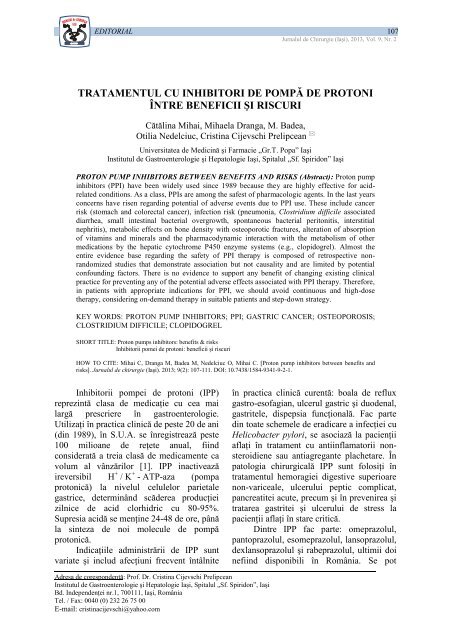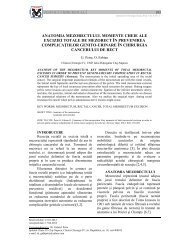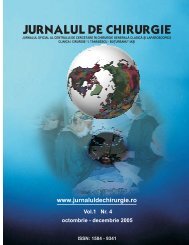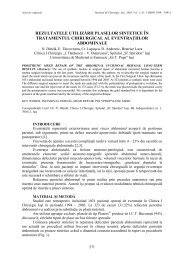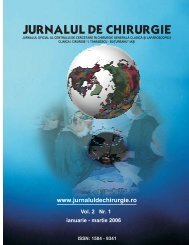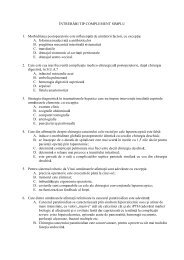PDF (5 MB) - Jurnalul de Chirurgie
PDF (5 MB) - Jurnalul de Chirurgie
PDF (5 MB) - Jurnalul de Chirurgie
You also want an ePaper? Increase the reach of your titles
YUMPU automatically turns print PDFs into web optimized ePapers that Google loves.
EDITORIAL 107<strong>Jurnalul</strong> <strong>de</strong> <strong>Chirurgie</strong> (Iaşi), 2013, Vol. 9, Nr. 2TRATAMENTUL CU INHIBITORI DE POMPĂ DE PROTONIÎNTRE BENEFICII ŞI RISCURICătălina Mihai, Mihaela Dranga, M. Ba<strong>de</strong>a,Otilia Ne<strong>de</strong>lciuc, Cristina Cijevschi Prelipcean Universitatea <strong>de</strong> Medicină şi Farmacie „Gr.T. Popa” IaşiInstitutul <strong>de</strong> Gastroenterologie şi Hepatologie Iaşi, Spitalul „Sf. Spiridon” IaşiPROTON PUMP INHIBITORS BETWEEN BENEFITS AND RISKS (Abstract): Proton pumpinhibitors (PPI) have been wi<strong>de</strong>ly used since 1989 because they are highly effective for acidrelatedconditions. As a class, PPIs are among the safest of pharmacologic agents. In the last yearsconcerns have risen regarding potential of adverse events due to PPI use. These inclu<strong>de</strong> cancerrisk (stomach and colorectal cancer), infection risk (pneumonia, Clostridium difficile associateddiarrhea, small intestinal bacterial overgrowth, spontaneous bacterial peritonitis, interstitialnephritis), metabolic effects on bone <strong>de</strong>nsity with osteoporotic fractures, alteration of absorptionof vitamins and minerals and the pharmacodynamic interaction with the metabolism of othermedications by the hepatic cytochrome P450 enzyme systems (e.g., clopidogrel). Almost theentire evi<strong>de</strong>nce base regarding the safety of PPI therapy is composed of retrospective nonrandomizedstudies that <strong>de</strong>monstrate association but not causality and are limited by potentialconfounding factors. There is no evi<strong>de</strong>nce to support any benefit of changing existing clinicalpractice for preventing any of the potential adverse effects associated with PPI therapy. Therefore,in patients with appropriate indications for PPI, we should avoid continuous and high-dosetherapy, consi<strong>de</strong>ring on-<strong>de</strong>mand therapy in suitable patients and step-down strategy.KEY WORDS: PROTON PUMP INHIBITORS; PPI; GASTRIC CANCER; OSTEOPOROSIS;CLOSTRIDIUM DIFFICILE; CLOPIDOGRELSHORT TITLE: Proton pumps inhibitors: benefits & risksInhibitorii pomei <strong>de</strong> protoni: beneficii şi riscuriHOW TO CITE: Mihai C, Dranga M, Ba<strong>de</strong>a M, Ne<strong>de</strong>lciuc O, Mihai C. [Proton pump inhibitors between benefits andrisks]. <strong>Jurnalul</strong> <strong>de</strong> chirurgie (Iaşi). 2013; 9(2): 107-111. DOI: 10.7438/1584-9341-9-2-1.Inhibitorii pompei <strong>de</strong> protoni (IPP)reprezintă clasa <strong>de</strong> medicaţie cu cea mailargă prescriere în gastroenterologie.Utilizaţi în practica clinică <strong>de</strong> peste 20 <strong>de</strong> ani(din 1989), în S.U.A. se înregistrează peste100 milioane <strong>de</strong> reţete anual, fiindconsi<strong>de</strong>rată a treia clasă <strong>de</strong> medicamente cavolum al vânzărilor [1]. IPP inactiveazăireversibil H + / K + - ATP-aza (pompaprotonică) la nivelul celulelor parietalegastrice, <strong>de</strong>terminând scă<strong>de</strong>rea producţieizilnice <strong>de</strong> acid clorhidric cu 80-95%.Supresia acidă se menţine 24-48 <strong>de</strong> ore, pânăla sinteza <strong>de</strong> noi molecule <strong>de</strong> pompăprotonică.Indicaţiile administrării <strong>de</strong> IPP suntvariate şi includ afecţiuni frecvent întâlniteîn practica clinică curentă: boala <strong>de</strong> refluxgastro-esofagian, ulcerul gastric şi duo<strong>de</strong>nal,gastritele, dispepsia funcţională. Fac partedin toate schemele <strong>de</strong> eradicare a infecţiei cuHelicobacter pylori, se asociază la pacienţiiaflaţi în tratament cu antiinflamatorii nonsteroidienesau antiagregante plachetare. Înpatologia chirurgicală IPP sunt folosiţi întratamentul hemoragiei digestive superioarenon-variceale, ulcerului peptic complicat,pancreatitei acute, precum şi în prevenirea şitratarea gastritei şi ulcerului <strong>de</strong> stress lapacienţii aflaţi în stare critică.Dintre IPP fac parte: omeprazolul,pantoprazolul, esomeprazolul, lansoprazolul,<strong>de</strong>xlansoprazolul şi rabeprazolul, ultimii doinefiind disponibili în România. Se potAdresa <strong>de</strong> corespon<strong>de</strong>nţă: Prof. Dr. Cristina Cijevschi PrelipceanInstitutul <strong>de</strong> Gastroenterologie şi Hepatologie Iaşi, Spitalul „Sf. Spiridon”, IaşiBd. In<strong>de</strong>pen<strong>de</strong>nţei nr.1, 700111, Iaşi, RomâniaTel. / Fax: 0040 (0) 232 26 75 00E-mail: cristinacijevschi@yahoo.com


